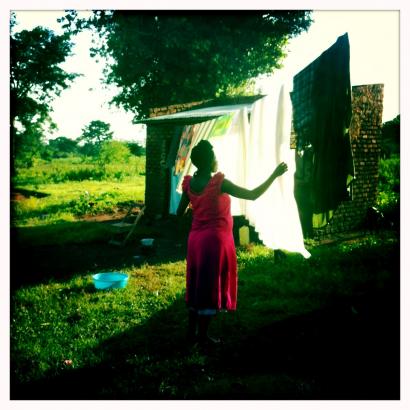Journalists and Pulitzer Center grantees Peter DiCampo and Austin Merrill presented their ongoing project, “Everyday Africa,” at the Pulitzer Center on Monday, September 25, 2017. The event, organized by the Pulitzer Center, attracted an audience of more than 100, pulling from interests and professions ranging from educators, journalists, photographers, and students.
During the lecture, they discussed how Everday Africa quickly gained a large following through its Instagram page. The page now has over 370,000 followers and mainly features photographers who are either native to African countries or have lived and worked there for an extended period of time.
Everyday Africa stemmed from a Pulitzer Center travel grant to the Ivory Coast in March 2012 while both DiCampo and Merrill were reporting on the year following their civil war. Frustrated by the prevelance of photographs from Africa portraying only poverty, disease, and war, they decided to challenge the western media stereotypes of Africa as a frightening and dangerous place.
Said Merrill: “One of the things that we’re trying to demonstrate is ... that a lot of these stories are common-themed, things that could take place anywhere in the world.”
Their project aims to depict Africa in a new light by bringing attention to the beautiful day-to-day moments in life that can otherwise go unnoticed by western photographers.
“We’re also trying to celebrate local norms, and there’s lots of things that are viralized that are very different, and we’re trying to find ways to embrace that as well,” said Merrill.
Everyday Africa has inspired other “everyday” spin-off projects around the world like Everyday Asia, Everyday Bronx, Everyday Middle East and more. Similarly, these projects take a deeper look into the region and let the natives share their own stories with the world.
In conjunction with District of Columbia Public Schools, the Pulitzer Center’s education team, and both journalists developed the Everyday DC project. The program allows DiCampo and Merrill to visit classrooms and inform students about Africa and how photography can be an effective tool inside the classroom as well as outside. The project encourages students to consider how media representations perpetuate stereotypes and how their own communities are being portrayed in news, social media and beyond.
“We were able to sort of talk about stereotypes and truth in storytelling and journalism through Everyday Africa," said Merrill, "and then turn the lens on them and this has been something we’ve done repeatedly in these various education program and say 'OK, well here we are in the south Bronx, what are some stereotypes you guys are working with?’”
Now in its second official year, Everyday DC has given students a platform to be storytellers in their own environment–documenting their neighborhoods, friends and family members living in the DC area.
The lecture closed with a book signing of Everyday Africa: 30 Photographers Re-Picturing a Continent.









